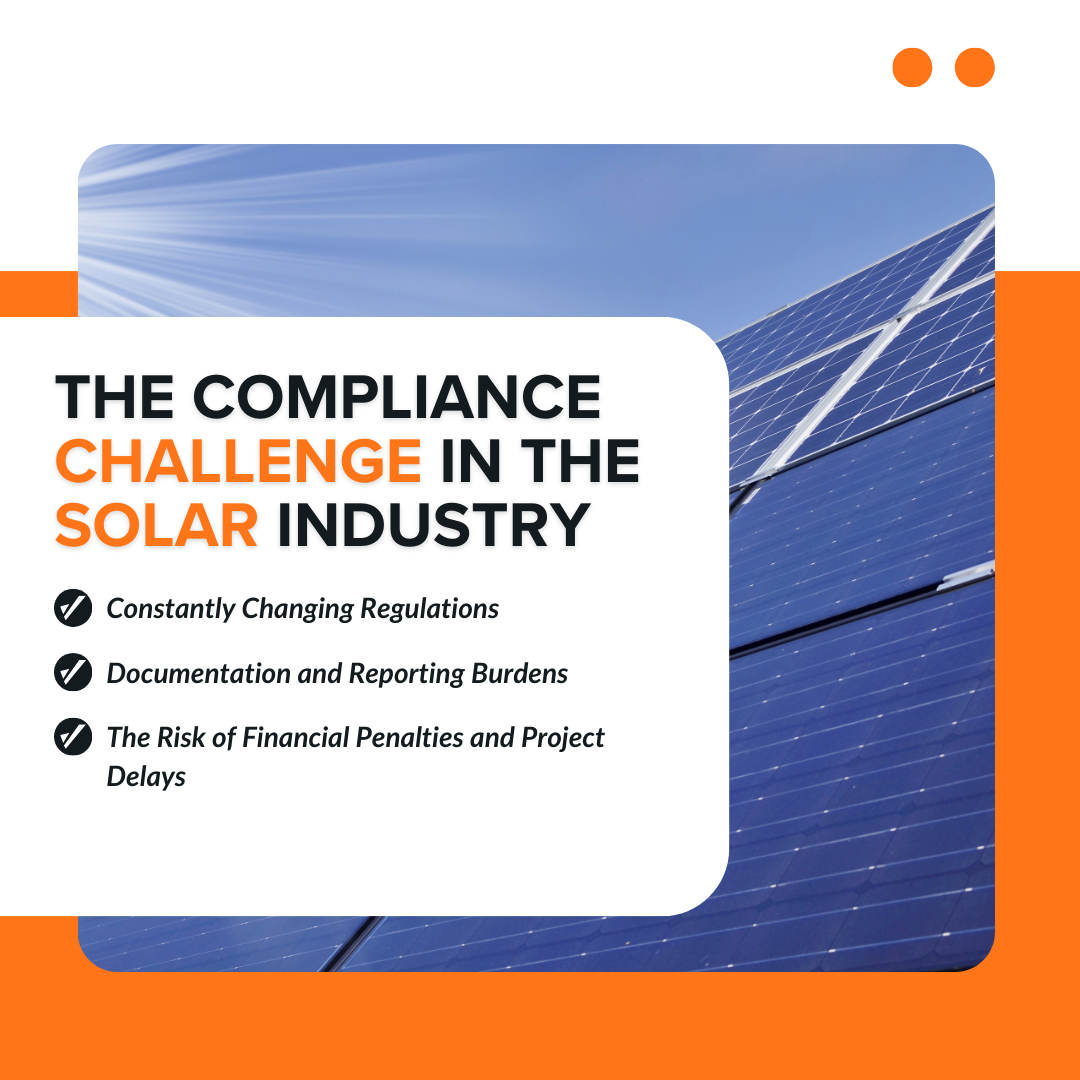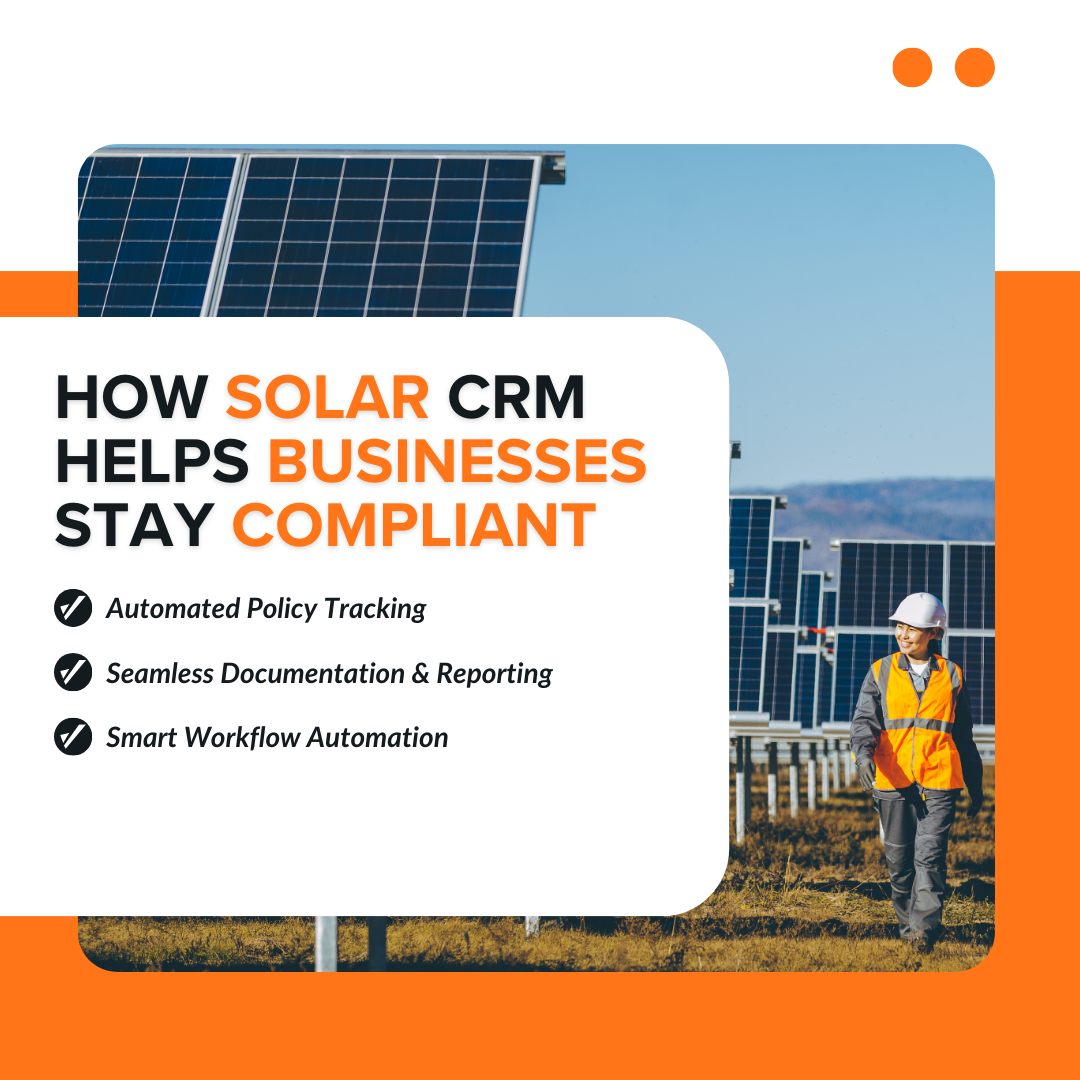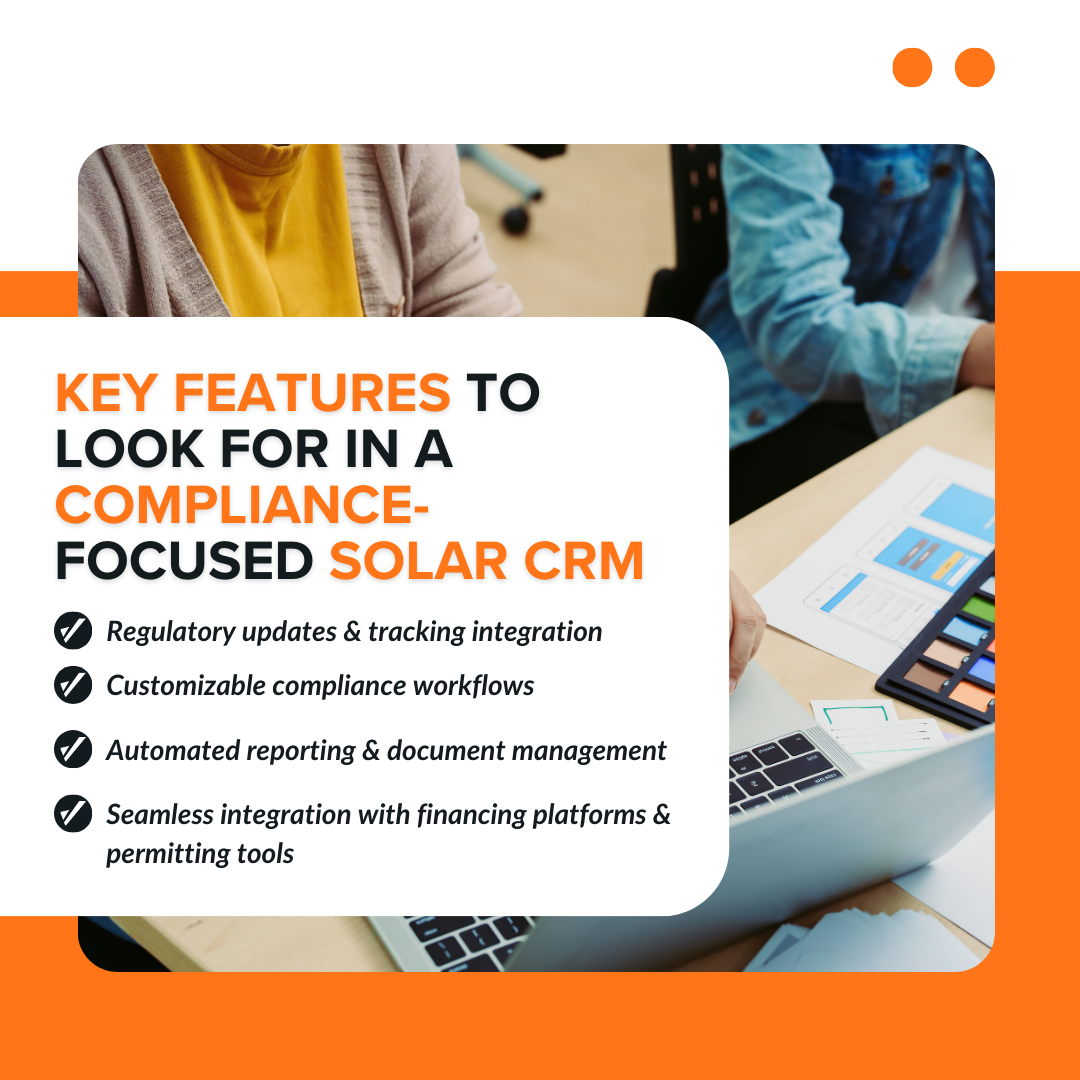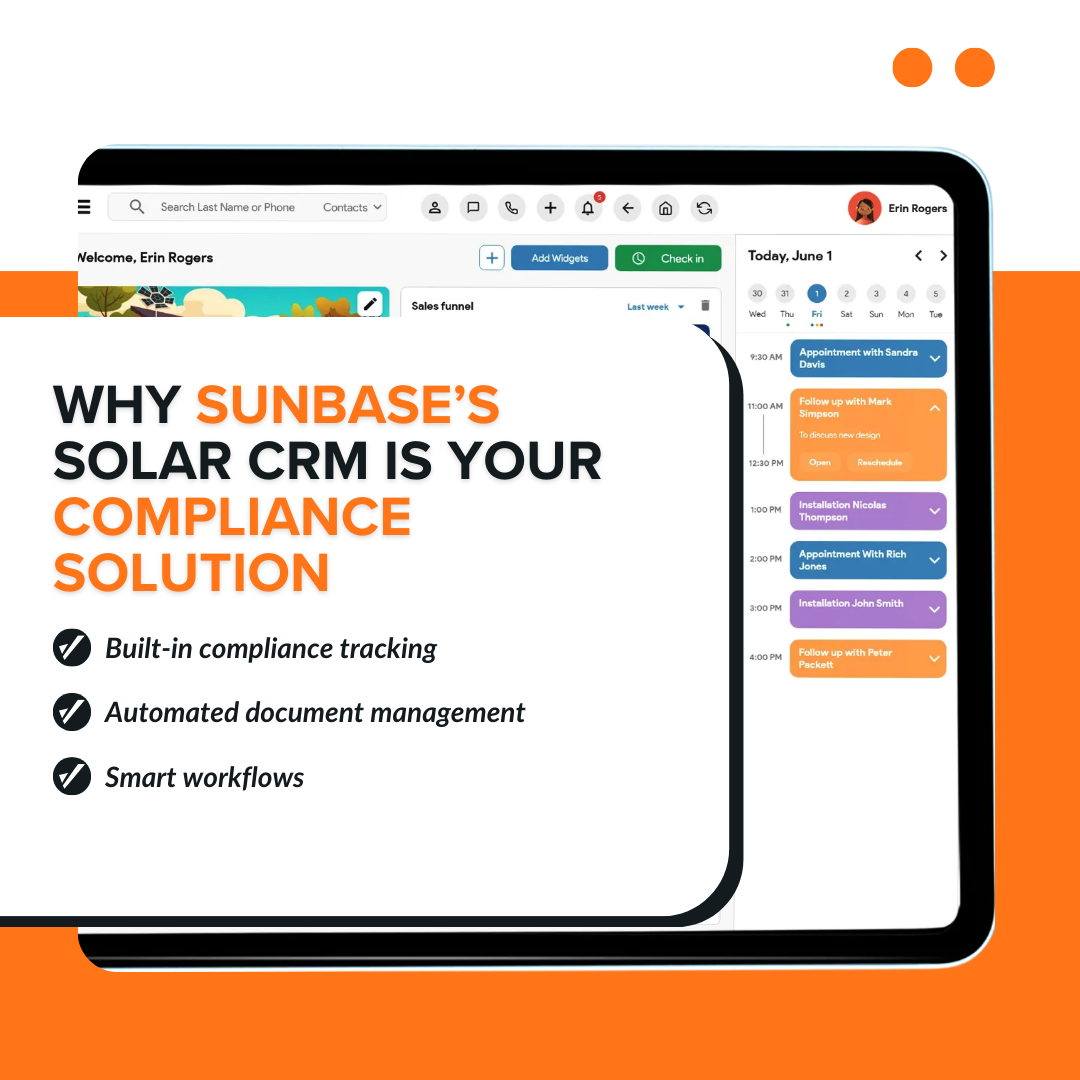Solar CRM Compliance: How to Stay Ahead of Regulatory Requirements
March 10, 2025
The solar industry is growing rapidly, but with that growth comes an increasingly complex regulatory landscape. Solar businesses must comply with a wide range of state and federal policies, including net metering changes, tax credits, tariffs, and permitting requirements. Failure to comply can result in fines, project delays, and lost revenue.
This is where Solar CRM (Customer Relationship Management) software plays a vital role. A compliance-focused solar CRM helps businesses stay updated on policy changes, automate documentation processes, and streamline compliance workflows.
In this blog, we will explore the key compliance challenges in the solar industry, how a robust solar CRM solution can address them, and why investing in the right tools is crucial for long-term success.
Key Takeaways
- The Compliance Challenge in the Solar Industry: Frequent regulatory changes, documentation burdens, financial risks of non-compliance.
- How Solar CRM Helps Businesses Stay Compliant: Automated policy tracking, seamless documentation, workflow automation.
- Future-Proofing Your Business - The Role of AI & Data Analytics: AI-powered predictive compliance, data-driven decision-making, automated risk assessment.
- Key Features to Look for in a Compliance-Focused Solar CRM: Regulatory tracking, customizable workflows, automated reporting, seamless integration with financing and permitting tools.
- Why Sunbase’s Solar CRM is Your Compliance Solution: Built-in compliance tracking, automated document management, and smart workflows for effortless regulatory adherence.
The Compliance Challenge in the Solar Industry

1. Constantly Changing Regulations
The solar industry is subject to frequent regulatory changes, which vary across states and even local jurisdictions. Net metering policies, tariffs, tax credits, and permitting rules are frequently updated, making it difficult for solar companies to keep up. For instance:
- Net metering reforms are reducing the compensation solar owners receive for excess electricity sent to the grid.
- Utility companies are implementing new tariffs and grid access charges that impact solar project feasibility.
- Federal incentives like the Inflation Reduction Act continue to provide tax credits, but eligibility criteria change over time.
Staying informed about these changes is critical for solar sales teams and project managers to make accurate project estimates and financial projections.
2. Documentation and Reporting Burdens
Solar companies must maintain extensive records to comply with regulations. This includes permits, contracts, financing documents, and interconnection agreements. Inefficient project management and manual document handling increase the risk of errors and non-compliance, leading to delays in project approvals.
Moreover, regulatory bodies often conduct audits to ensure solar projects meet compliance standards.
Without an efficient document management system, retrieving necessary paperwork for audits becomes a major challenge.
3. The Risk of Financial Penalties and Project Delays
Non-compliance with regulatory requirements can have serious consequences. Fines, penalties, and project cancellations can erode profitability and damage a company’s reputation.
For instance, failing to adhere to new interconnection rules can result in solar installations being denied access to the grid, leading to substantial financial losses.
To mitigate these risks, solar businesses need an advanced CRM platform that simplifies compliance management and provides real-time policy tracking.
Read: Understanding Solar CRM: A Beginner’s Guide
How Solar CRM Helps Businesses Stay Compliant

A powerful solar CRM software automates compliance processes, reducing the burden on sales reps, project managers, and finance teams. Here’s how a solar CRM solution can help:
1. Automated Policy Tracking
- Stay updated on net metering rules, tax incentives, and utility rate changes.
- Receive real-time alerts on policy shifts and new compliance mandates while enhancing lead management.
- Avoid costly mistakes by ensuring accurate financial projections for solar installations.
2. Seamless Documentation & Reporting
- Automatically store and organize permits, contracts, and regulatory documents.
- Enable easy access to compliance paperwork for audits and inspections.
- Improve efficiency by reducing manual data entry and document errors.
3. Smart Workflow Automation
- Ensure all projects follow state and federal compliance guidelines with a structured sales process that minimizes regulatory risks.
- Reduce human error with automated approval processes.
- Standardize customer communication and reporting for regulatory bodies.
Check out: 10 Ways a Solar CRM Can Revolutionize Your Business Workflow
Future-Proofing Your Business: The Role of AI & Data Analytics in Solar Compliance

1. AI-Powered Predictive Compliance
AI-driven tools can analyze historical policy changes and predict future regulatory shifts, allowing solar businesses to adapt their strategies proactively.
By integrating AI-powered compliance tools within a solar CRM platform, companies can stay ahead of the curve and minimize risks.
2. Data-Driven Decision Making
Leveraging real-time insights from compliance data helps businesses optimize their strategies. By analyzing solar project trends, policy updates, and market fluctuations, companies can make informed decisions that improve project success rates, even in complex sales cycles.
3. Automated Risk Assessment
Using AI-based risk assessment tools, solar businesses can identify potential compliance risks before they become costly issues. These tools flag discrepancies in project documentation, track regulatory deadlines, and provide proactive recommendations for compliance management.
Integrating AI-driven tools in your Solar CRM ensures long-term success in a rapidly evolving industry.
Read: Streamline Solar Installations with AI Solar Software
Key Features to Look for in a Compliance-Focused Solar CRM

To effectively manage compliance, solar companies should invest in CRM software that includes:
- Regulatory updates & tracking integration – Stay informed about changes in net metering, tariffs, and tax credits to optimize your sales pipeline.
- Customizable compliance workflows – Adapt CRM functionality to your company’s specific compliance needs.
- Automated reporting & document management – Ensure seamless audits and regulatory filings.
- Seamless integration with financing platforms & permitting tools – Connect seamlessly with third-party software to streamline the approval process.
Check out: Top Features to Look for in Solar Software
Why Sunbase’s Solar CRM is Your Compliance Solution

At Sunbase, we understand the unique compliance challenges faced by solar businesses. Our best solar CRM offers:
- Built-in compliance tracking – Stay ahead of solar policy changes and regulatory updates.
- Automated document management – Simplify audits with easy access to compliance documents through solar software integration.
- Smart workflows – Ensure that all solar projects meet legal requirements effortlessly.
By leveraging Sunbase’s solar CRM solution, solar companies can improve efficiency, save time, and grow their business without worrying about regulatory hurdles.
Read: Simplifying Lead Management for General Contractors with Sunbase
Conclusion
Compliance is one of the most critical challenges in the solar industry today. As regulations evolve, solar companies must adapt quickly to remain competitive and avoid financial risks.
Solar CRM software that is compliance-focused provides the right tools to track regulations, automate documentation, and optimize workflows. By investing in a CRM platform like Sunbase, solar businesses can ensure compliance, enhance operational efficiency, and drive growth.
Ready to streamline your compliance processes? Contact Sunbase today to learn how our solar CRM can help you stay ahead of regulatory requirements!
About Sunbase
Solar compliance made easy! Sunbase keeps your permits, regulations, and approvals in check—so you can focus on growing your business. Stay ahead—try Sunbase today!
FAQs
Q1. Why is compliance important in the solar industry?
Compliance ensures that solar businesses follow state and federal regulations, avoiding fines, project delays, and financial losses.
Q2. Why should solar companies choose Sunbase’s CRM?
Sunbase’s CRM is designed specifically for solar businesses. It helps them stay compliant, improve efficiency, and grow without regulatory concerns.
Q3. Are compliance requirements the same for residential and commercial solar?
Not always. Larger projects often have stricter permitting, grid connection, and environmental impact regulations.
Q4. Can missing a permit really shut down a project?
Absolutely. A single overlooked permit or approval can halt work, costing time, money, and resources.
I agree to receive marketing messaging from Sunbase at the phone number provided above. I understand data rates will apply, and can reply STOP to OPT OUT.
Company
Industries
Features
Copyright ©2021
Terms of Service |
Privacy Policy







